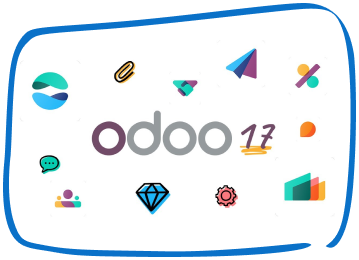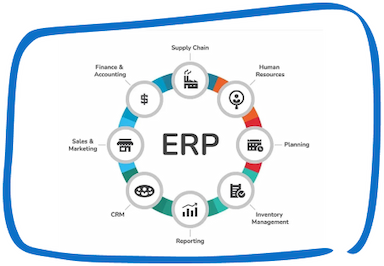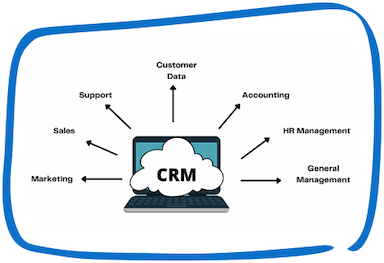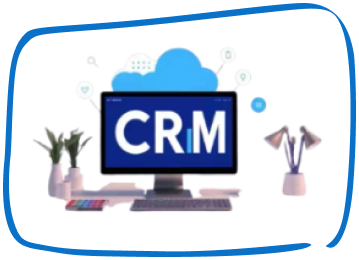Enterprise resource planning (ERP) Software and customer relationship management(CRM) software are often the two main software options that businesses choose when attempting to automate essential business processes.
CRM UAE helps organizations manage how customers interact with their businesses.
While ERP connects financial and operational systems to a single database to help businesses run successfully.
Both are essential data storage facilities.
Both ERP Dubai and CRM encompass multiple departments, despite occasionally using the same platform.
The software is frequently bought separately and then integrated as needed.
To determine whether a firm requires ERP, CRM, or both, this article will highlight the important similarities and differences between CRM and ERP.
Let’s talk about customer relationships Management (CRM) -
Customer Relationship Management or CRM Software UAE is a piece of software that assists a business in connecting with current and potential clients.
This customer relationship management (CRM) program controls, automates and coordinates sales.
The goal of creating such an application is to bring up and delight prospect leads, which aids the company’s growth in sales and general performance.
Following are some key features of CRM :
- All of the client services are centralized using this program.
- This is utilized to oversee and manage the organization’s operations.
- It helps in increasing the performance of sales.
- Primarily focused on customers.
What is ERP?
Material needs planning (MRP), which allowed manufacturers to comprehend and manage all the resources required to run a successful business, gave rise to enterprise resource planning (ERP).
All elements of a company use ERP as a shared database.
Fundamentally, this refers to money matters, such as the general ledger (GL), payroll, accounts payable, accounts receivable, and financial reporting.
ERP, however, encompasses data about service organizations as well as inventory management, order management, supply chain management, and data management.
ERP covers all aspects of production, distribution, fulfillment, and procurement.
Some ERP systems additionally provide e-commerce, CRM, and human resources management systems (HRMS).
CRM Advantages -
The main goal of CRM is to provide businesses with a single location to store all client information and also to keep track of all customer interactions.
With this knowledge and the aid of analytics, organizations can make better choices regarding which consumers to target for increased revenue and the effectiveness of their sales teams.
And also it is the most effective way to provide customer service and more.
For instance, sales representatives will be able to respond appropriately if consumers they are visiting have open customer support tickets thanks to a centralized CRM system.
As an alternative, customer service can identify callers who are high-value customers or who have the potential to be high-value customers rapidly and direct them to the proper service tier.
ERP Advantages -
An ERP system’s advantages derive from having a single, common database for all operational and financial data.
This has a significant impact on reporting, including both routine monthly reports and special reports that leadership requests.
Employees may drill down into reports to find financial insights thanks to a single source of operational and financial data, eliminating the requirement for IT or finance teams to perform the research and reporting.
As a result, firms can take quicker, data-supported decisions that can affect a variety of factors, including profitability, potential for future growth, and organizational efficiency.
A quicker financial close is another advantage that businesses commonly list when switching to an ERP system.
At the end of each month or quarter, finance teams typically tabulate the results after accounting for all revenue and expenses, a process known as closing the books.
When using spreadsheets or basic accounting software, closing the books often involves a lot of human labor, data entry, and contacting several departments for financial data.
Companies have claimed shorter monthly close times thanks to centralized ERP systems that automate many of those procedures; this task may now only take a week or a few days.
Additionally, ERP systems greatly improve the financial controls within a firm.
Only employees with the appropriate job functions have access to critical information using a centralized system and role-based permissions, enhancing audit trails and lowering financial risk.
Difference between the ERP and CRM -
ERP
CRM
ERP software solutions assist businesses in managing their business operations.
CRM is the name of the program that streamlines customer communications with the business.
All the processes are streamlined using a centralized system.
The only channel for converting customers into potential clients is CRM.
The term “ERP super set” refers to SAP.
It is a division of SAP.
ERP systems are more concerned with increasing organizational productivity and cutting costs.
CRM solutions are centered on the interactions between customers and the business.
- CRM software systems do not contain ERP components, however, some ERP systems contain CRM, while others do not.
Which one, ERP or CRM, is superior?
ERP software Dubai has features like
Accounting - It is one of the features of ERP; it offers multi-currency accounting capabilities as well as tax calculation, information, bank, and payment settlement tools
HR and Payroll - This feature enables you to create and manage employee payrolls and tax regulations.
Manufacturing - Using a production and planning system, ERP enables you to plan your inventory and material.
CRM - It also assists in organizing all client interactions and relationships for your business.
Projects - You can specify and assign tasks to projects, as well as record time for work performed on tasks, using this feature.
CRM software UAE has features like -
Businesses in the UAE use CRM software to track and analyze client contacts, as well as to generate reports that explain why sales are increasing or decreasing.
- CRM Dashboard
- The Customer Relationship Management or CRM software UAE Dashboard will offer you a brief overview of all the significant sales statistics and metrics, goals to be met, and also the productivity of all of your company’s sales leaders.
- Lead management - This section has to be updated with all of the leads that the sales representatives have generated. Also, this allows you to keep track of every possible consumer and their pertinent data.
- Opportunity management in CRM
- The marketing team’s produced leads can be qualified and advanced to the opportunity stage. You may now screen out potential clients and the deals they are interested in. Thus, the sales team can communicate with customers directly and provide them with product estimates.
ERP software Dubai can manage Accounting, HR and payroll, sales and purchasing, projects, and customer management. Because some ERP software includes CRM so you can manage the customers also. However, CRM can only manage the relationship with customers.
Speak with Our Team!
4.9 Stars
1k+ reviews on






